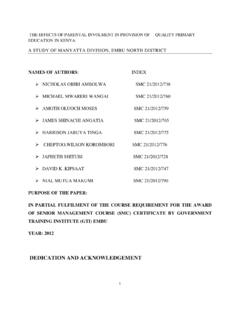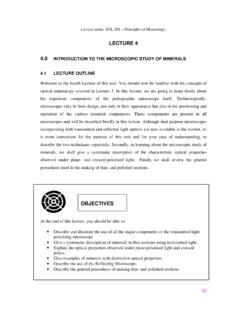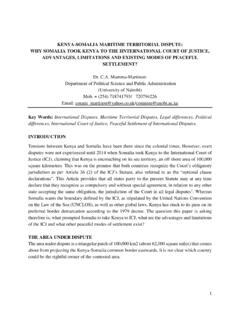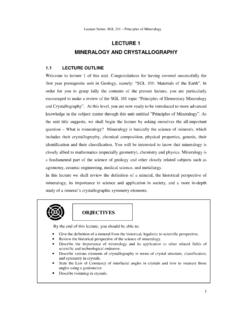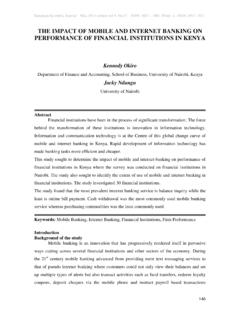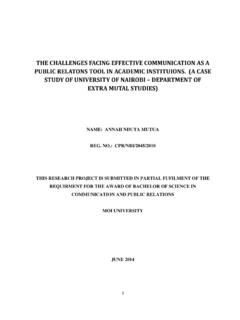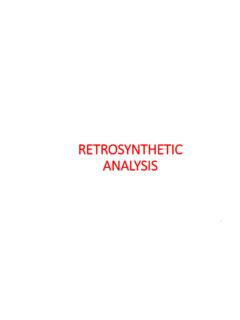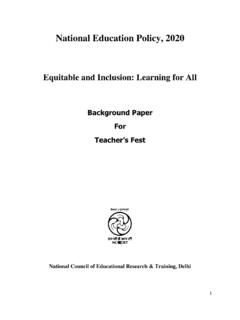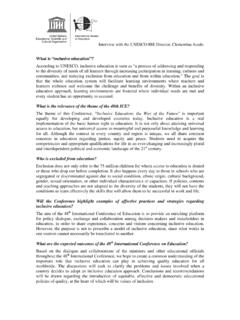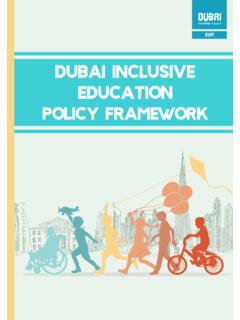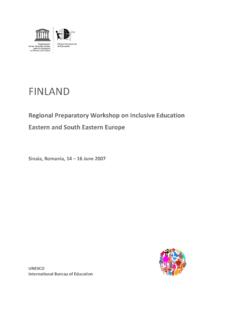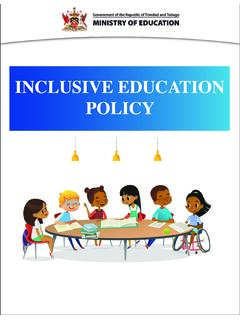Transcription of Approaches to Inclusive Education and Implications for ...
1 International Journal of Humanities Social Sciences and Education (IJHSSE) Volume 4, Issue 10, October 2017, PP 92-106 ISSN 2349-0373 (Print) & ISSN 2349-0381 (Online) International Journal of Humanities Social Sciences and Education (IJHSSE) Page | 92 Approaches to Inclusive Education and Implications for Curriculum Theory and Practice Mercy M. Mugambi School of Education , University of Nairobi, Kenya 1. INTRODUCTION Worldwide, there has been emphasis on the need to extend access to Education to all.
2 This has been verified through a number of international conventions which include: the Salamanca statement on special needs Education , UNESCO, 1994, the UN convention on the Right of the Child, 1989, and the UN international convention on the Right of the Persons with Disabilities (2000). Education is understood as a tool that can be used to reduce poverty, to improve the lives of individuals and groups, and to transform societies (Grubb and Lazerson, 2004). Providing an Inclusive Education to all is necessary because it is linked to human, economic, and social development goals.
3 Failure of any Education system to provide an Education for all children not only leads to an educational underclass, but also a social and economic underclass which has serious consequences for society now and in the future. Development of policies that support Inclusive Education at all levels of Education is essential as a way of promoting learning and participation of all children in Education . The global emphasis on knowledge economy has necessitated competitive reforms in Education to increase efficiency of the school system and also to comply with the market place principles in Education (Ball, 2006).
4 Might these disadvantage learners with some learning difficulties? To ensure that no child is disadvantaged, main stream reform legislation has been enacted by many countries to develop their special Education system or to encourage greater inclusion of children considered to have disabilities or learning difficulties. Such a policy has Implications on the role of the teacher and learning institutions, the curriculum and teacher Education programmes. Dealing with differences and diversity of learners continues to one of the biggest challenges faced by learning institutions across many countries (European Agency on the Development of Special Education , 2006).
5 Some of the challenges arise from inflexible or irrelevant curriculum, didactic teaching methods, and inappropriate Abstract: Education is a fundamental human right as well as an instrument for economic growth and human development. Education is valued because it contributes to national development through the provision of human resource that helps to stimulate productivity and eliminate poverty, disease and ignorance. The World Declaration on Education for All adopted in Jomtein, Thailand (1990) set out the vision on universalizing access to Education for all topromote equity.
6 Inclusive Education aims to strengthen the capacity of the Education system to reach out to all children. Learning should be based on the clear understanding that learners are individuals with diverse characteristics and backgrounds, and the strategies to improve quality should therefore draw on learners knowledge and strength. Many Acts originating from the 1948 Universal Declaration of Human Rights have been documented to support Inclusive Education . Despite the emphasis on Inclusive Education , many challenges face its implementation: many curricula in learning institutions are still built around a model of a traditional student which creates challenges for many of different types of learners; studies show that teachers do not feel prepared to undertake responsibility of an Inclusive classroom and most times, teachers are not sure what to expect socially.
7 ; learning environment fail to support nature of different learners and un authentic assessment of achievement of learning outcomes. This paper presents the human right based and multicultural Approaches to Inclusive Education and their Implications for curriculum theory and practice in relation to differentiated curriculum content, instructional process, differentiated assessment, reorienting teacher Education and involvement of parents and community. Keywords: Approaches to Inclusive Education , Curriculum theory and practice, Curriculum Implementation, Inclusive Education *Corresponding Author: Mercy M.
8 Mugambi, School of Education , University of Nairobi, Kenya Approaches to Inclusive Education and Implications for Curriculum Theory and Practice International Journal of Humanities Social Sciences and Education (IJHSSE) Page | 93 Approaches to assessment and examination, poor preparation of teachers and limited teacher support system. Seed (2006), notes that successful teaching of children with individual differences requires that they are grouped homogeneously so that special pedagogical Approaches can be deployed by the teachers who have been trained to use them so that the system encourages participation for all learners.
9 Evans and Lunt (2012) observe that the implementation of Inclusive Education policies has been uneven globally. Many reasons are associated with these disparities; limited funding, and resources, competing polices that stress the achievement of set standards among others. Additionally, it has been suggested that one of the greatest barriers to the development of inclusion is because teachers do not have the required competencies (knowledge, skills and attitudes) to implement policies on Inclusive Education .
10 Social justice and inclusion are highly important in today s society and are sought after in the twenty first century of Education to allow every child to flourish in their learning in and have their talents nurtured and developed (Commission for Social Justice, 1994). Social justice in Education can only be delivered by Inclusive schools and teachers (Dyson, 1999). Social justice implies a sense of fairness which ensures social circumstances are not regarded as barriers to achievement (Field etal, 2007).
